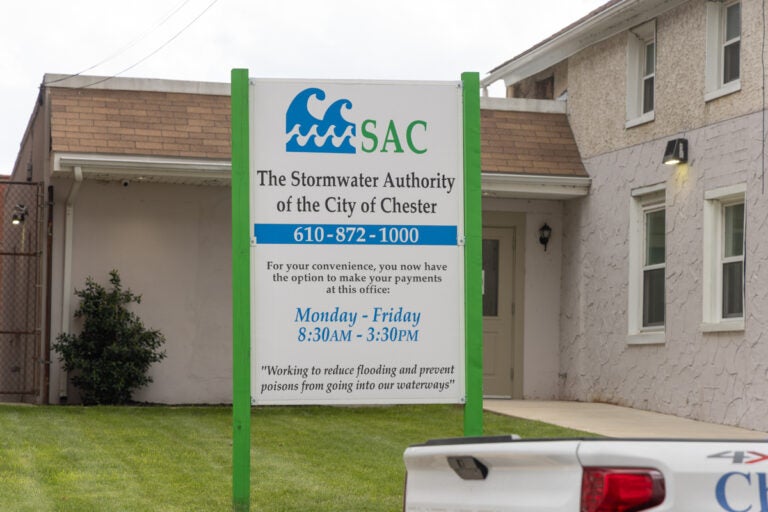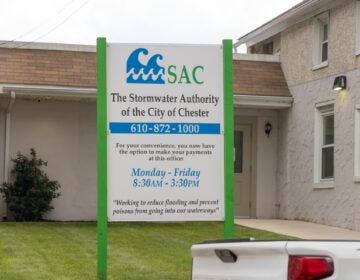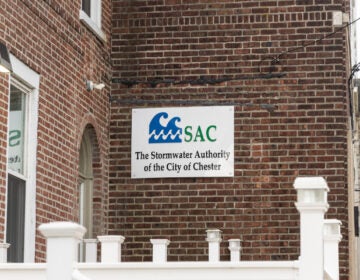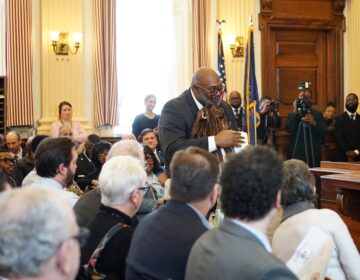Chester’s stormwater chief has retired. His exit comes as agency faces scrutiny from state-appointed receiver
This marks the second time in three months a city authority leader has retired from their position.
Listen 0:55
The Stormwater Authority of the City of Chester on East 5th Street. (Kimberly Paynter/WHYY)
From Delco to Chesco and Montco to Bucks, what about life in Philly’s suburbs do you want WHYY News to cover? Let us know!
Horace Strand retired Nov. 15 as executive manager of the embattled Stormwater Authority for the City of Chester (SAC).
“I’m getting older, and the stresses that come along with that responsibility was something that I needed to walk away from,” Strand said.
Strand’s exit comes as the agency faces heavy scrutiny from state-appointed receiver Michael Doweary, who has been tasked since 2020 with rescuing the bankrupt city’s finances.
Doweary’s office filed a motion in May with the U.S. Bankruptcy Court to gain access to SAC’s financial records. He alleged SAC conducted an unauthorized board expansion, stonewalled officials and paid board salaries without permission. Additionally, the receiver’s office also criticized SAC for taking out a loan from Strand and his church in order to make payroll. In August, Doweary expressed his desire to monetize the city’s water assets to make up for the city’s fiscal shortfalls.
Attorneys for the receiver’s office deposed Strand and SAC board chair Livia Smith on Oct. 25 as part of the original case and put the authority under the microscope.
The office highlighted an instance where Corvias Infrastructure Solutions (CIS), SAC’s private partner, donated a $400,000 building to the executive manager’s nonprofit, according to transcripts acquired by WHYY News through an open records request.
Strand described the hours-long deposition as “hostile.” However, he said it played no role in his retirement, a decision he made a year ago. He provided WHYY News with a letter from CIS to his nonprofit, deeming the building a “restricted gift.”
“When they couldn’t find anything to really put their hands on, they came up and exaggerated this gift that Corvias had made to my non-profit,” Strand said. “And so that’s when it all just went haywire.”
In a letter to WHYY News, CSI stated that it purchased the property to establish a community resiliency center. After internal deliberation, the company determined that working with a local nonprofit would be the best way to proceed.
“The terms of the Restricted Gift Agreement require that the sole purpose of the property be as a climate resiliency center and local business incubator, focused on supporting the environmental, social, and economic resiliency of the City of Chester community,” the letter read.
Neither the stormwater authority nor SAC Board Chair Livia Smith responded to a request for comment about the deposition and the future of SAC. Vijay Kapoor, chief of staff to the receiver, declined to comment.
Patrick J. Harvey, an attorney with Bala Cynwyd-based law firm Campbell Durant, who also serves as the receiver’s counsel, led Strand’s examination. According to deposition transcripts, he said the transaction “appears to be a really concerning violation of ethics.”
“We also have legitimate inquiries about whether this asset is being run appropriately for the best interests of its functions. And this raises some catastrophic issues about whether it is,” Harvey said of SAC as a whole.
Deposition transcripts outline tense exchange over $400,000 building
Stormwater authorities are government-created entities tasked with managing and reducing pollution and the runoff of rainwater and melted snow. Authorities impose a fee on property owners to upkeep the system and repay loans to fund infrastructure projects.
Chester City Council and then-Mayor Thaddeus Kirkland first established SAC in 2016. The Pennsylvania Infrastructure Investment Authority (PENNVEST) is the state agency responsible for financing projects through low-cost loans. Since 2017, PENNVEST has given SAC more than $43 million for about a half dozen projects. SAC has also acquired street sweepers, trucks and buildings to operate.
“It was remarkable what we were able to get done, but the biggest problems I had was with this administration that came in and the receiver that had an axe to grind because they were trying to find funding to deal with the financial difficulties the city was in,” Strand said.
The predominantly Black city of 33,500 people is among the poorest communities in Pennsylvania. Yet, residents pay among the highest stormwater fees in the state.
Arguably, the largest point of contention during the deposition dealt with Strand’s own nonprofit, Children First America. According to Strand’s testimony, the entity has no employees and he does not receive a salary as its president.
To pull off stormwater projects, SAC entered into a public-private partnership in 2018 with CIS to essentially serve as a project manager.
The company’s letter said it performs “planning, design, construction, installation, management, maintenance, repair, replacement and inspection services on various approved green infrastructure-driven stormwater control projects.” SAC is responsible for securing funds and determining how to use it.
In 2023, CIS-SAC Incubator, a subsidiary of CIS, purchased a two-story building at 35 E. 5th Street in Chester for $400,000. According to Smith’s deposition, SAC’s board previously toured the building for use as “in-house billing.” Property records show CIS-SAC Incubator sold the building to Children First America Delaware County in April for $10. Harvey asked Strand whether or not he viewed this as a conflict of interest.
“Not at all,” Strand said during the deposition. “Because they’re still — they’re still committed to what they do for SAC. I informed my Board that they were purchasing the property to establish an East Coast facility on the East Coast. That was what they told me their original plans were. OK? Later, whatever made them change their plan, they decided that they did not want to follow through with their plans and that they preferred to donate the facility to a nonprofit. And since they were familiar with the work that we were doing, they chose us. I didn’t see anything wrong with it.”
Attorneys John A. Gagliardi and Brian Hanstein of West Chester-based law firm Wetzel, Gagliardi, Fetter & Lavin, LLC, and William G. Roark, with Lansdale-based law firm HRMML, represented SAC at the deposition. None of the lawyers represented Strand personally.
The attorneys raised a series of objections about the relevancy of Harvey’s line of questioning — specifically his inquiry as to why Children First America needed a building if its principal address is Strand’s church. Harvey shared his reasoning.
“We have a gentleman who is managing this company, who is making a lot of money off of his $43 million in fees, and setting their own rates, and apparently not being supervised; getting a $400,000 gift from that company while he has the fiduciary duty to be supervising that company,” he said. “That’s the relevancy.”
Strand told WHYY News that his nonprofit provides scholarships and that the building will allow it to run more community programs and workforce development initiatives. He said he played no role in CIS’s decision-making.
During Smith’s interview, she told the receiver’s office that she found out about Strand’s business transaction a month prior.
”As an individual, I am comfortable with that,” Smith told Harvey during her deposition.
SAC operations come under fire
Strand holds a bachelor’s degree in theology and an honorary doctorate. Outside of his previous employment with SAC, Strand is a pastor at Faith Temple Holy Church in Chester.
During the deposition, he described himself as an “environmental activist.” He said he was appointed three times as advisor to the secretary of the Environmental Protection Agency (EPA) to assist with environmental justice issues across the country.
Before being appointed as executive manager of SAC, he had no previous experience as an employee of a stormwater authority.
The first SAC board meeting occurred on May 31, 2016, before the stormwater authority was officially incorporated on Oct. 31, 2016. Strand said during the deposition that there were process issues.
During the opening moments of the first meeting, Kirkland appointed seven members to the stormwater authority board — including Strand.
Several of the board appointees were council members. Strand said prior to the meeting, Kirkland approached him about establishing the authority and his desire to place him on the board.
“Help me with this, though. So the city was broke, the city had no money. But the authority is being formed, the plan is to get somehow $50 million in funding,” Harvey said. “Am I correct?”
Strand affirmed.
Harvey unloaded a slew of questions about how such an arrangement came about, who organized it and whether it was publicly advertised, among other details. Strand said he was unable to “recall” some of the facts.
At that same meeting, the board was established. The new board unanimously voted to appoint Strand, a board member, as the executive manager of the authority. To Strand’s knowledge, no other candidates were explored. He didn’t have to fill out an application. His initial salary was set at $120,000. Harvey wanted to know how that figure was decided.
“I may have asked for it. I don’t remember the details of it,” Strand said.
At the deposition, Stand said his yearly compensation as executive manager of SAC was $167,000.
He also told Harvey that he received $1,000 per month to accommodate a vision impairment and “fringe benefits.” SAC did not provide general medical coverage for Strand.
In order to get the stormwater authority off the ground, the agency needed funding. According to meeting minutes, Strand stated that he would raise $478,000 for the fiscal year. Harvey asked him what his plan was.
“A miracle,” Strand said. Harvey repeated Strand’s one-word answer back to him in the form of a question.
That “miracle” was acquiring a $1 million grant from the state to kick things off.
In July 2017, the city submitted a pollution reduction plan to the Pennsylvania Department of Environmental Protection to comply with state regulations. It included best management practices that the community should complete to receive an MS4 (Municipal Separate Storm Sewer System) permit.
The twice-revised plan estimated that the total construction costs to bring the city into compliance with best management practices would be $1.1 million in construction costs, $95,000 in engineering costs and an annual maintenance cost of $30,000.
Strand said that was not enough money to deal with the city’s neglected stormwater infrastructure.
“The infrastructure in the City of Chester was the most deplorable infrastructure anywhere in Delaware County,” he said during the deposition. “People were walking on inlets and falling in the hole when we took over the system. So whatever was proposed, it was not adequate to deal with the needs of the city.”
He pushed back on the idea that the city’s projection would help with a system ill-equipped to deal with 21st-century storms. He said SAC never approved the city’s plan. Harvey pressed Strand on whether a formal rate study was ever completed. Strand asserted it was.
“The rate study was done in the very beginning by engineers, when we actually formalized the stormwater authority,” Strand said during the deposition. “And it was based on [a] projection of us doing $50 million worth of work in the City of Chester and what it would take us to pay those rates at a low interest rate from the state of Pennsylvania over a 30-year period.”
Harvey said he could not locate the study on SAC’s website and followed with a formal request. As he closed the deposition, Harvey attempted to tie all of his questioning together.
“Why did we go from $1.25 million in required projects to $43 million that weren’t required under the law, that this gentleman says a mystical study occurred to come about that doesn’t seem to exist,” Harvey said as a SAC attorney interjected.
PENNVEST follows a nine-step financing process, which includes a multi-department project review and a final inspection. The point of contention was whether the stormwater authority provided enough oversight of CIS-led projects and whether they were necessary.
“We have the taxpayers of this poverty-stricken city paying some of the highest stormwater rates in the country because all this massive debt was taken on,” Harvey said in closing. “And we have a company that was supposed to be managed during all these projects that — what management was going on that? Because we have all these indicators, and — that required paperwork that was required and filings that no one seems to know where they are.”
Chester Mayor Roots, Strand divided on SAC’s ‘financial dilemma’
When first-term Mayor Stefan Roots ran his mayoral campaign, he criticized SAC’s operations. Strand blamed Roots for the entity’s fiscal problems in October 2023, leading him and his church to loan money to the authority. He told WHYY News that Roots’ criticism of the entity during his mayoral bid disrupted the cash flow.
“At that point, for a while, people stopped paying their rates, and we had a financial dilemma,” Strand said.
He said it was the first time in eight years that SAC had money issues.
“We’re both with government agencies,” Strand said. “You just don’t do that and so, and from that point on, he has never — never — said anything positive about the stormwater authority. And so, what happened was, I had to lay people off, and we was getting rid of them. We didn’t have money to pay, so I used personal funds.”
Roots dismissed Strand’s reasoning as “unfair and untrue.”
“Everything I said was the truth and was substantiated through what was discovered in the deposition,” Roots said.
He had heard rumors of Strand’s retirement earlier in the year. However, he was nonetheless “surprised.” The authority tapped Bruce Conner Jr., assistant executive manager, to run the agency in the interim. This marks the second time in three months that a city authority changed leadership without informing Roots. He has yet to meet Conner.
“As a courtesy, I would’ve expected to have a heads-up and maybe even some input on that decision,” Roots said, adding that he looks forward to sitting down with Conner.
Roots previously clashed with Chester City Councilmembers Fred Green and Portia West, who both serve on the stormwater authority’s board. Because they receive two salaries — one for their work as council members and another for their job on board — Roots accused them of violating the city charter in April. The board members in question resigned but later returned to their positions with the authority.
Regarding his issue with city council members also serving on SAC’s board, Roots doesn’t plan on taking any legal action to have them removed. He wants to wait for the receiver’s process to play out.
“I still hold pretty firmly that the Chester City Charter is very clear in its language,” Roots said. “Sometimes the language in these charters can be pretty arcane and old-fashioned, but this, a fifth-grader can understand. City council members should not be on paid government boards in the city of Chester. And that position is also supported by our solicitor, but they choose to remain, and we’ll see what happens as a result.”

Get daily updates from WHYY News!
WHYY is your source for fact-based, in-depth journalism and information. As a nonprofit organization, we rely on financial support from readers like you. Please give today.







